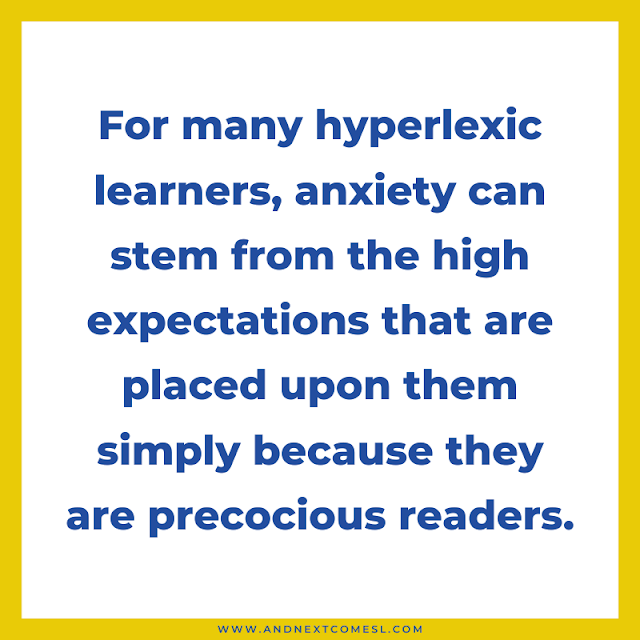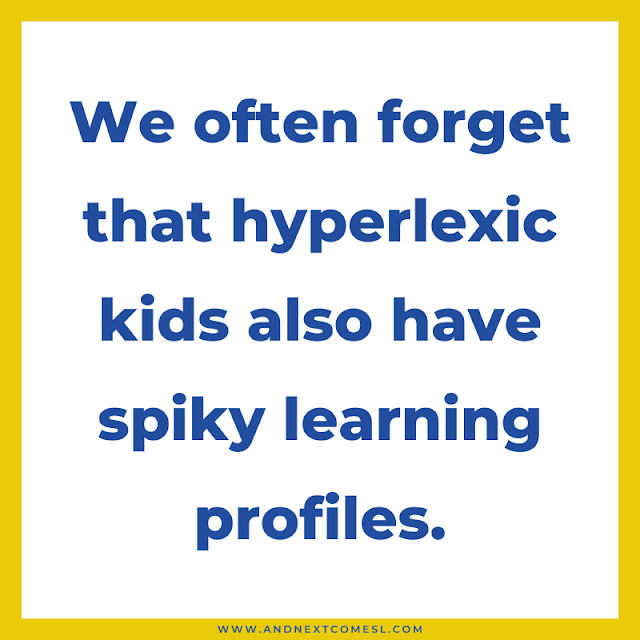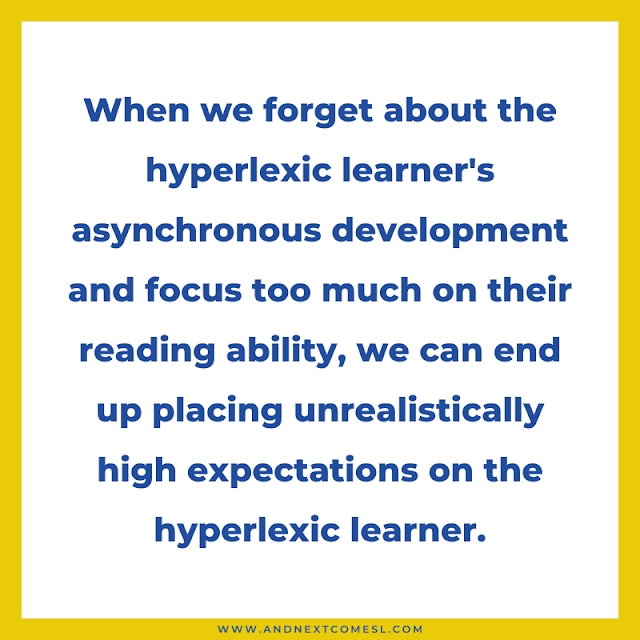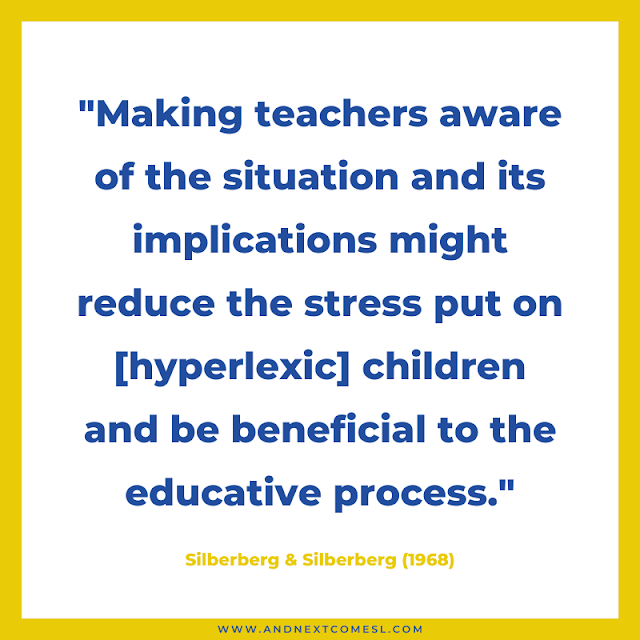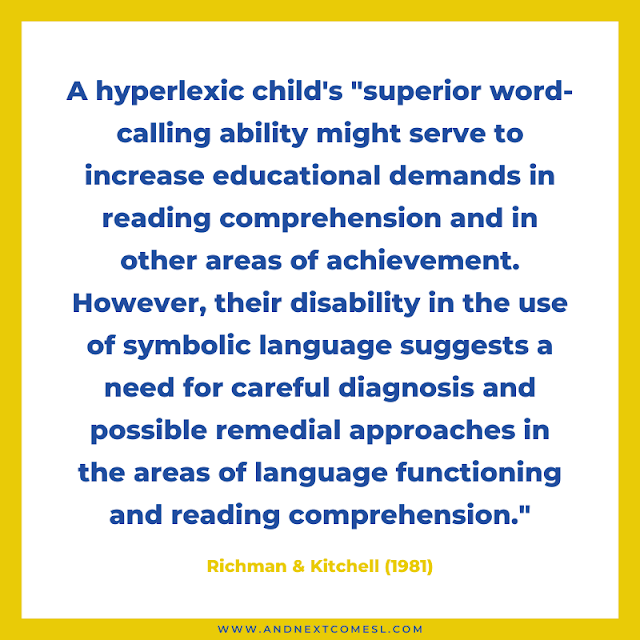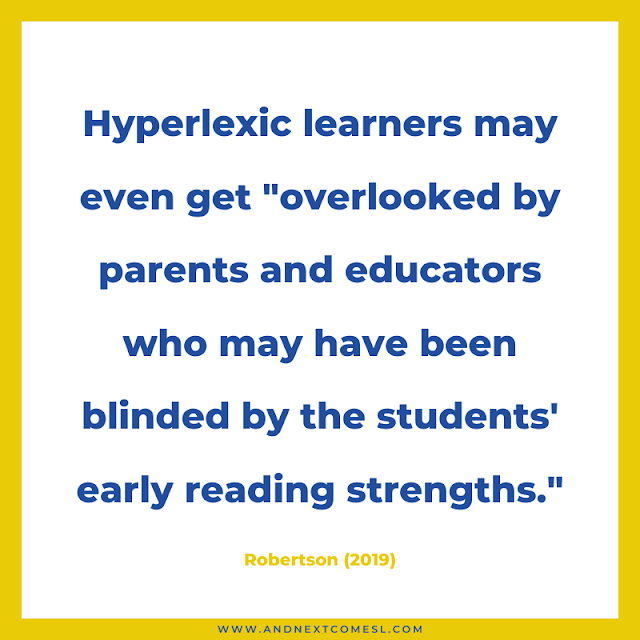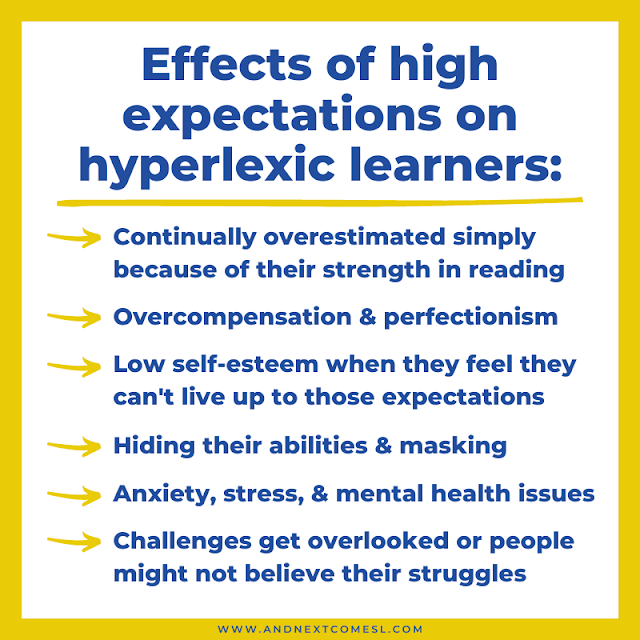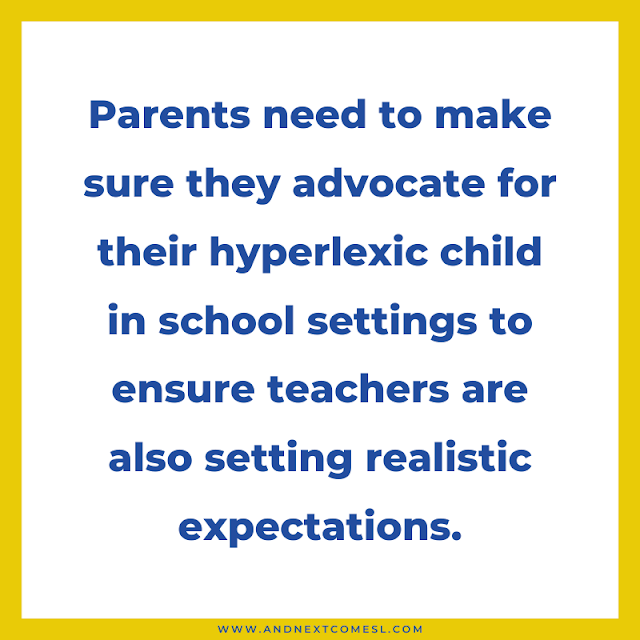Many hyperlexic children have anxiety or specific and unusual fears.
Maybe you've noticed that the Happy Birthday song sets them off or the sight of Judge Judy triggers a full on sensory meltdown or shutdown.
Or maybe their anxiety is much more general or all-encompassing.
For many hyperlexic learners, the anxiety can actually stem from the high expectations that are placed upon them simply because they are precocious readers.
In fact, that's something that's been pointed out as far back as the 1960s when hyperlexia was first being described and defined.
A link between anxiety and hyperlexia has been discussed a few times throughout the hyperlexia literature, which we'll cover below. And it's definitely something we need to talk more about.
So, below we'll look at the effects of high expectations in hyperlexia, as well as the stress and anxiety that result from those expectations.
Heads up that this might not be an easy topic to read and explore, especially as a parent of a hyperlexic child. But it's an incredibly important one. So stick with me.
An Overview of Hyperlexia, High Expectations, & Anxiety
As mentioned above, many parents and teachers have high expectations for hyperlexic kids. It's not always intentional, I might add.
I mean here you have a toddler or preschooler reading everything you put in front of them. They might be a child that's also spontaneously teaching themselves different languages or complex math. It's amazing and incredible.
So, of course, it makes sense to continue to expect more amazing and incredible things from them. It's also a lot of pressure for our kids though.
But, too often, we forget that hyperlexic kids also have spiky learning profiles.
So you might have a four year old reading and learning about the periodic table of elements who isn't potty trained yet. Or you might know a hyperlexic adult who was always miles ahead in reading levels, but can't tie their shoes.
When we forget about their asynchronous development and focus too much on their reading ability, we can end up placing unrealistically high expectations on the hyperlexic learner.
That's actually something that Silberberg and Silberberg even noted back in their 1968 paper on hyperlexia.
They wrote that, "The demands put on hyperlexic children are greater than they may be able to handle, due to the unrealistically high expectations, both by the teachers and parents, based on the children's precocity in reading. The results of the child's inability to meet these expectations are environmental stress and an accompanying high level of anxiety."
They further elaborated by saying that, "The potentiality of later stress is expected to take the form of anxiety provoked by unrealistic assessment of their abilities and the high levels of demands placed on them by teachers and parents. It would seem that merely making teachers aware of the situation and its implications might reduce the stress put on these children and be beneficial to the educative process."
And that's actually what Richman and Kitchell (1981) confirmed in their research. They found that, "The present results are consistent with the Silberbergs' (1968) concern regarding undue educational stress placed on these children by unrealistic expectations of parents and teachers."
Specifically, Richman and Kitchell found that a hyperlexic child's "superior word-calling ability might serve to increase educational demands in reading comprehension and in other areas of achievement. However, their disability in the use of symbolic language suggests a need for careful diagnosis and possible remedial approaches in the areas of language functioning and reading comprehension."
The Effects of High Expectations in Hyperlexia
The implications from Richman and Kitchell's quoted research are huge here.
First of all, a hyperlexic child might get continually overestimated simply because of their strengths in one area (i.e., reading). Which is something Lyric at Neurodivergent Rebel, a hyperlexic and autistic adult, has mentioned in this video of theirs.
So the hyperlexic child might try to overcompensate for the challenges that they're facing (hello, perfectionism!). Then they end up putting immense pressure on themselves to perform at a certain standard as a result. And that will eventually catch up with them.
This need to overcompensate and strive for perfection can lead to lots of anxiety and stress. Just like the Silberbergs described back in the 1960s.
They might begin to feel like a failure or have low self-esteem because they feel they cannot live up to the expectations placed upon them.
There's a great quote from an episode of the Neurodiversity Podcast on tweens and transitions that touches on that a bit. "Especially in the case of kids who are twice exceptional who are gifted but who may struggle in one particular area. Those kids are just as likely to be perfectionistic as kids who are just plain gifted, but then they have maybe a challenge that's getting in their way and that can be especially distressing because they're so hyperaware of exactly how they're falling short in their own mind."
Another implication here is that hyperlexic kids might try to hide their abilities. Or they might withdraw from participating in class or specific activities as a way to avoid showing their true abilities.
This article on Psychology Today, for instance, points out that, "When the parents' expectations directly contradict how children experience themselves, children may hide parts of their identity."
And that certainly does happen with hyperlexic kids. For example, there are some hyperlexic kids who avoid reading or participating in class, preferring instead to minimize or hide their skills as a way to perhaps fit or blend in.
And, if you're familiar with autistic masking at all, then you know that that's not good. It has a long term impact on mental health. As it is, comprehension masking in hyperlexia is extremely common.
It's also important to note that the challenges that often accompany hyperlexia might not be properly identified or supported because of these high expectations. These kids may even get "overlooked by parents and educators who may have been blinded by the students' early reading strengths." (Robertson, 2019).
As a result, hyperlexic kids may feel let down because people might not believe their struggles, disregard them, and/or downplay the challenges they face.
As the Psychology Today article touches on, "Parental expectations are harmful when they are not based in our attunement to our children...our expectations can strike a debilitating blow to our children's development."
Recent research by Curran and Hill (2022) even notes that, "increases in parental expectations and parental criticism likely offer one of the most plausible explanations for rising perfectionism so far." And perfectionism is definitely something we see all too often in hyperlexic children.
So What Now?
Clearly, it's important to set realistic expectations for our hyperlexic learners. Otherwise, there could be anxiety, self-esteem issues, masking, and so much more to watch out for.
You not only have to consider the strengths and talents of hyperlexic kids, but also their challenges and asynchronies. It's a fine balance, I know.
For many hyperlexic children though, there's just too much focus on the strengths and abilities and not nearly enough focus on the areas they might need extra support with. Or sometimes it could be the reverse with too much focus on the can't dos and not enough focus on highlighting their abilities and strengths.
Parents and teachers aren't doing this intentionally, by the way. I just want to reiterate that point. But more often than not, hyperlexic learners end up with ridiculously high expectations placed on them.
Sometimes the high expectations might be due in part to denial of co-occurring conditions or misinformation about hyperlexia. For instance, some parents don't want to admit that their child could very well be autistic or that hyperlexia is usually a red flag for comprehension issues (as Robertson 2019 notes).
Other times it's just part of societal expectations and educational demands that end up putting our hyperlexic learners into a very specific box. So parents feel they have to push their kids so hard academically just to keep up with the Joneses or whatever.
And other times it's simply that parents and educators don't know about hyperlexia yet. So they can't possibly understand the nuances of this unique learning style as a result.
Regardless, parents need to make sure that their hyperlexic children are well supported in all areas and that they also put reasonable and realistic expectations on them.
Parents need to make sure they advocate for their hyperlexic child in school settings as well to ensure teachers are also setting realistic expectations.
Remember, the Silberbergs suggested that, "It would seem that merely making teachers aware of the situation and its implications might reduce the stress put on these children and be beneficial to the educative process." It was true in 1968 and is still true today.
Parents also need to familiarize themselves with the signs of masking and anxiety and watch for the presence of those signs in their hyperlexic learners.
As some final food for thought, it was recently found that parents should "focus on prioritizing intrinsic, prosocial values that promote affiliation and community at least as much (or more than) they prioritize academic performance and external achievement. Parenting practices that directly or indirectly (i.e., modeling) encourage intrinsic versus extrinsic pursuits, and contribute to the satisfaction of children's needs for autonomy, competence, and relatedness, may help children adopt life goals that foster happiness and well-being." (Ciciolla et al., 2016)
And I think we can agree that we want happy hyperlexic kids, not stressed out, frazzled kids who struggle due to the effects of high expectations and the anxiety that often accompanies those expectations.



